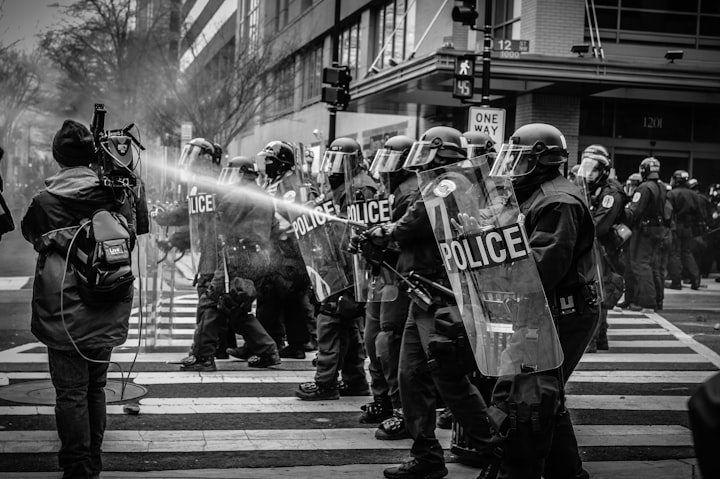Police, Soldiers, and Lawyers Oh My
Tyranny sets precedents and the road to hell is paved with good intentions as they say. Police enforce the laws, but who makes the laws? Politicians do. I’m not naïve enough to believe politicians are decent, uncorrupted individuals (I doubt you believe that either)

As a freshman college student, I might’ve had a ‘thin blue line’ sticker on my laptop, except that it was 2012 and policing hadn’t yet become such a controversial issue. I was a cookie cutter conservative at the time and had yet to own my beliefs. Politics seemed so horribly partisan back then but was tame compared to today. Now, almost a decade later, I can’t say that I am very supportive of the police. I mean yeah, I hope they catch the ‘bad guys’ and put them in jail and I hope there is minimal loss of life in that process, for both the police and the presumed criminals… I say “presumed” because the American justice system enshrines “innocent until proven guilty” as key to justice.
Somewhat humorously, I am more conservative now than I was a decade ago. Generally, in America today that would mean I support the police vigorously. But I don’t. So why not? Why am I not like many of my comrades?
First, let me tell you where I was during the riots and protests of 2020. Around the same time the Reduction in Violence treaty for Afghanistan was signed, I was on my way to Afghanistan with other soldiers. Eventually, I ended up at a fairly remote base that we were preparing to hand over to the Afghan National Army. (Funnily enough, I’ve seen that base in video of a Taliban checkpoint since they took over the country.) Our duties there were to pull guard shifts in towers to ensure the security of the base and to search local contractors before they came onto the base.
I spent a lot of time with fellow soldiers in guard towers. One of the benefits of the United States military is that it is the most diverse part of American society. I had excellent discussions about the events happening back in America with people who didn’t look like me, didn’t grow up like I did, and didn’t think like I did. Also, I was a leader and at my level had to have a working understanding of our Rules of Engagement (what was legal for us to do in a war-zone and what was illegal). Bluntly put, if an American Soldier was as quick on the trigger as police often are, the solider would be in jail for life. This is despite the fact that American and Coalition forces had been killed in green on blue attacks (when a partner force member like the Afghan National Army defects to the enemy and tries to kill coalition forces).
Those two reasons alone made me less sympathetic to police officers and their liberal use of force. I mentioned that another part of our duties was to search local contractors coming onto the base. We took as many precautions as we could, but at the end of the day, we were interacting with someone from another culture who barely spoke our language. The kicker was that the Taliban or ISIS-K could’ve showed up at this person’s house and told them they would kill their family if they didn’t wear a suicide vest or belt when they came to work the next day.
Think about that for a moment. In the United States and the developed world, we are so sheltered from evil that the word has become shallow and lacks visceral meaning.
Thankfully nothing like that happened to us while we were there. Our entire deployment was peaceful, which considering the current state of Afghanistan seems ridiculous. Older soldiers who have deployed there or to Iraq when the fighting was hot have experienced heartbreaking deployments. A tiny minority of them broke under the pressure and committed war crimes. But the overwhelming majority had to conduct themselves professionally, knowing that any misstep could lead to an out of context video appearing on Al-Jazeera.
Considering the standards of the American military as we interact with local populaces and terrorists, and contrasting that with how the police interact with fellow citizens and neighbors has made me very critical. Even then, I would hold my tongue when it comes to high stress situations. Mistakes do happen and I understand that being a police officer is a tough job.
But then there are stories like this:
“A deaf man who communicates with sign language was roughed up by two Colorado officers…Court officials eventually dropped the charges after Mistic was behind bars for four months without an interpreter.”
“A paraplegic man in Ohio was pulled from his car and thrown to the ground by police.”
Karen Garner suffered a fractured and dislocated shoulder along with a sprained wrist during a arrest by Loveland Police. Garner is 73 years old, suffers from dementia, and at five feet tall weighs eighty pounds.
A man was arrested for selling loose cigarettes. He was killed by the police officer’s choke hold during the arrest.
“Mr. Clark lost consciousness and flew backwards from the tasing, striking his head on a dining room chair on the way down. Mr. Clark was ultimately hospitalized with heart complications, and 36 hours later had a stroke. He was never charged with any crime."
“Gugino was injured when two police officers shoved him backwards during a protest against racism and police brutality on June 4. Video of the incident shows that he fell to the sidewalk and his head began bleeding as other officers walked by him.”
The worst thing about these incidents is that police departments defend them. If ‘proper’ procedures were followed and that led to disproportionate injury, then the procedure aren’t proper. Is the state of New York so badly mismanaged that it kills people for daring to sell cigarettes without tax?
Employees of the Government, federal and local, should not have greater freedom to commit wrongs than the average citizen. They hold a position of public trust and that *should* mean they are held to a higher standard. However, police officers are rarely held accountable for their wrongs the way other people are. A police officer can send a citizen to a hospital and get a slap on the wrist, where an employee who says wrong things (without context) on video at a dog park will immediately lose their job.
The government broadly lacks accountability to its citizens, which is the opposite of how it is designed to function. Bureaucracy and spineless politicians have enabled public servants to forget that they exist to serve the public, not abuse it. While the root cause might be the same level of incompetence, shooting someone is both worse and more visible than fining them—so naturally, police are in the spotlight more as governance worsens.
Beyond general incompetence or mistakes though, there are other factors that lead me to distrust police. First, I grew up in a middle-class home. I didn’t know any lawyers, I never knew someone who hired a lawyer, and I always saw hiring a lawyer to be horribly expensive. To this day I would barely know how to begin if I believed there was a case for legal action against the police. However, legal action is one of the few levers available to attempt to hold the government accountable for the actions of their bad employees.
So here exists a soft tyranny: someone without knowledge may be wronged. They may even feel like they were wronged by police. But their economic or education background could make them feel that justice is beyond their grasp. Our justice system is quickly becoming class-based. Only those with the money or connections to access legal help can protect themselves from the abuses of the government.
Second, there’s the wide world outside America. Culturally, Canada and Australia are relatively similar to America. While differences exist, they are smaller than the differences between say China and America. But police in Canada have been arresting and jailing pastors. Australian police are now interrogating citizens about their social media posts and possibly arresting bloggers for ridiculing them.
Those incidents have all been related to COVID-19, so some people might defend them as unique moments in time. I disagree. Tyranny sets precedents and the road to hell is paved with good intentions as they say. Police enforce the laws, but who makes the laws? Politicians do. I’m not naïve enough to believe politicians are decent, uncorrupted individuals (I doubt you believe that either). I think most politicians would use their power to make themselves look good. All it takes is a few truly bad politicians who pass dubious laws for the ‘public health,’ and a police force willing to enforce it.
Now to be clear: not all police officers are bad. All it takes is a few bad ones to make the rest look terrible. Unfortunately, our society has created a catch-22. Bad police officer commits abuse and the footage goes viral -> Pundits turn that into a talking point about how bad all police are -> Then local politicians rail against the departments they are supposed to exercise oversight over. I can’t imagine that any of this encourages good people – the people who we need to be police officers – to consider it as a career. So, the candidate pool is hemorrhaging good people while the bad candidates are learning to make sure nobody is filming.
I also wonder how many of the problems with society are representative of society. It sure seems like we don’t value things like honor, decency, or even shame as internal characteristics. Instead, we rely upon the consequences of our actions. Or more accurately, wrong is only wrong when the consequences attached are painful. Perhaps our moral compass is broken, and it doesn’t matter what we do; there will be more bad police officers and more criminals regardless of any policies. Is fixing the police a policy issue? Maybe our society has decayed too far for any policy prescription to improve anything.
About the Creator
Farah Thompson
A writer just trying to make sense of a world on fire and maybe write some worthwhile fiction.






Comments
There are no comments for this story
Be the first to respond and start the conversation.